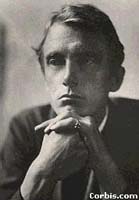Aspens Poem by Edward Thomas
Aspens
All day and night, save winter, every weather,
Above the inn, the smithy and the shop,
The aspens at the cross-roads talk together
Of rain, until their last leaves fall from the top.
Out of the blacksmith's cavern comes the ringing
Of hammer, shoe and anvil; out of the inn
The clink, the hum, the roar, the random singing -
The sounds that for these fifty years have been.
The whisper of the aspens is not drowned,
And over lightless pane and footless road,
Empty as sky, with every other sound
No ceasing, calls their ghosts from their abode,
A silent smithy, a silent inn, nor fails
In the bare moonlight or the thick-furred gloom,
In the tempest or the night of nightingales,
To turn the cross-roads to a ghostly room.
And it would be the same were no house near.
Over all sorts of weather, men, and times,
Aspens must shake their leaves and men may hear
But need not listen, more than to my rhymes.
Whatever wind blows, while they and I have leaves
We cannot other than an aspen be
That ceaselessly, unreasonably grieves,
Or so men think who like a different tree.
This poem has not been translated into any other language yet.
I would like to translate this poem
I am not familiar with the work of Edward Thomas. Has he been anthologized much? Though I prefer free verse, or less regular rhyming and rhythm, this poem succeeds better than most because of the nostalgic imagery and the metaphoric connection of the poet with the aspens. And it's just a pleasure to read aloud - with a little practice. One question: is there a typographical error in line 12? should no ceasing be not ceasing or now ceasing? As it is, I haven't figured out how to read it.